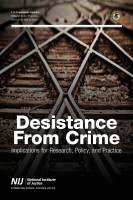Offenders
Desistance From Crime: Implications for Research, Policy, and Practice
Building a High-Quality Correctional Workforce: Identifying Challenges and Needs
Connecting the Dots: Identifying Suspected Serial Sexual Offenders Through Forensic DNA Evidence.
Reappraising and Redirecting Research on the Victim-Offender Overlap
A Social Interactionist Approach to the Victim-Offender Overlap
The Liberation Hypothesis Perspective and Juvenile Court Outcomes: Implications for an Understanding of the Interplay Between Offender and Offense Characteristics
School Safety Considerations for Distinct Student Populations - Breakout Session, NIJ Virtual Conference on School Safety
On February 16-18, 2021, the National Institute of Justice hosted the Virtual Conference on School Safety: Bridging Research to Practice to Safeguard Our Schools. This video includes the following presentations:
See the YouTube Terms of Service and Google Privacy Policy
The Victim-Offender Overlap: One Class of Crime Victim Rarely Seeks, Receives Available Services
Social Learning and Social Control in the Off and Online Pathways to Hate and Extremist Violence
Research on Offender Decision-Making and Desistance From Crime: A Multi-Theory Assessment of Offender Cognition Change
Advancing Understanding, and Informing Prevention of Public Mass Shootings: Findings from NIJ Funded Studies, Part 2
In recent years, NIJ invested in several research projects to advance understanding and inform prevention of public mass shootings.
See the YouTube Terms of Service and Google Privacy Policy
Advancing Understanding, and Informing Prevention of Public Mass Shootings: Findings from NIJ Funded Studies, Part 1
In recent years, NIJ invested in several research projects to advance understanding and inform prevention of public mass shootings.
See the YouTube Terms of Service and Google Privacy Policy
Expanding Research to Examine the Impacts of Forensic Science on the Criminal Justice System
In 2004, the National Institute of Justice created the social science research on forensic sciences (SSRFS) research program to explore the impact of forensic sciences on the criminal justice system and the administration of justice. Much of the early research from the SSRFS program focused on DNA processing and the use of DNA in investigations and prosecutions.
See the YouTube Terms of Service and Google Privacy Policy



